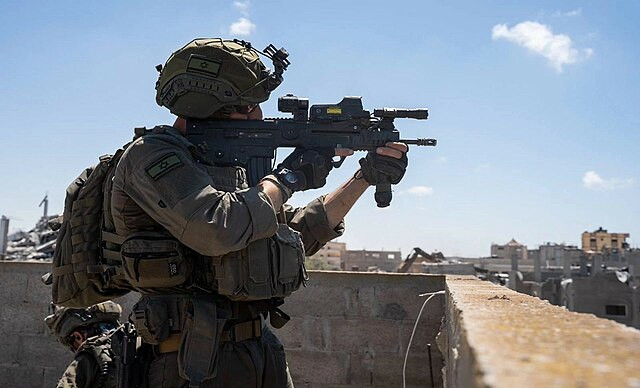The Israeli military has acknowledged significant failures in its response to the October 7 Hamas attack on Kibbutz Be'eri, where 132 civilians and soldiers were killed, and 32 others taken hostage. An interim internal investigation by the Israel Defense Forces (IDF) concluded that a combination of strategic unpreparedness and poor tactical coordination left the kibbutz vulnerable for hours before aid arrived.
The report, released Thursday, detailed that the IDF "failed in its mission to protect the residents of Kibbutz Be'eri" by not providing sufficient warning and failing to deploy troops adequately. "It is painful and difficult for me to say this: the IDF should have protected the residents of Kibbutz Be'eri, but unfortunately we were not there during the long hours of the fighting," said IDF spokesman Daniel Hagari during a press briefing.
For seven hours, the residents of Be'eri, a community of about 1,000 people, defended themselves against the assault by Hamas and Islamic Jihad militants. Their bravery and resourcefulness helped stabilize a defensive line that prevented the attack from spreading further within the kibbutz. "The extraordinary bravery and resourcefulness of the residents led to the stabilization of a defensive line during the first hours of fighting, stopping the attack from spreading to the rest of the kibbutz," Hagari added.
The report highlighted that the military had only prepared for isolated infiltrations rather than a coordinated, large-scale attack on multiple communities and army bases. This lack of preparedness meant no troops were available to immediately respond to the crisis at Be'eri. When IDF forces did arrive, they remained massed outside the kibbutz and did not engage the militants effectively, prioritizing the rescue of wounded soldiers over civilian protection, which the IDF acknowledged as a colossal mistake.
One controversial decision defended by the inquiry was the shelling of a house where Hamas fighters were holding 14 hostages, resulting in at least one civilian death and another injury. Brig. Gen. Barak Hiram, the commander on the ground, ordered the shelling to enable Israeli forces to storm the house, though only two hostages survived the eventual rescue attempt. Hagari stated that this decision was made professionally and responsibly to try and save lives.
The findings of the probe were shared with survivors and relatives of the victims. While they welcomed the transparency, many criticized the report for not exploring alternative actions that could have been taken by the troops and commanders. "The government brought about this situation, and they must be held to account," said Rami Gold, a member of the Be'eri civilian response squad.
Defense Minister Yoav Gallant echoed this sentiment, calling for a national-level investigation to rebuild public trust. "It should check all of us: decision-makers and executive officers, the government, the army, and the security agencies," Gallant said. "This is necessary for our continued existence."
The IDF's operational errors were not limited to the initial response. The inquiry found that the IDF struggled to assess the situation in Be'eri until the afternoon of October 7, despite updates from the local emergency team. "Combat in the area during the initial hours was characterized by a lack of command and control, a lack of coordination, and a lack of order among the different forces and units," the report stated.
The turning point came only when a senior officer was appointed to coordinate the forces in the area, regaining operational control. By 4:15 p.m., the 99th Division had established command and control at the kibbutz, and by 6 p.m., around 700 IDF soldiers and security forces were operating in the area.
Lt. Gen. Herzi Halevi, Chief of the General Staff, accepted the conclusions of the inquiry and acknowledged the IDF's grave failure. "From the afternoon hours onwards, forces were waiting outside the kibbutz while the massacre continued inside. This situation is extremely grave and cannot occur," Halevi said.
The inquiry also focused on the effort to save 13 hostages held in a house in Be'eri. The investigation concluded that Hamas operatives likely killed the hostages, despite earlier speculation that they were killed by Israeli tank fire. "The decision to carry out a rescue attempt under fire was made after all attempts to hold negotiations to rescue the hostages were exhausted," Hagari explained.
Be'eri survivors are now calling for a state commission of inquiry to fully examine the failures and provide answers to help them recover. "The failure of the army has been burned into our bodies and in our hearts for nine months," said Be'eri spokesperson Michal Paykin. "We demand to deal with the abandonment that is happening right now across the border - the abandonment of the hostages to their fate for nine months."
Defense Minister Gallant supported this call, emphasizing the need for a comprehensive investigation to address the intelligence and operational failures of October 7 and to prevent such events in the future.




